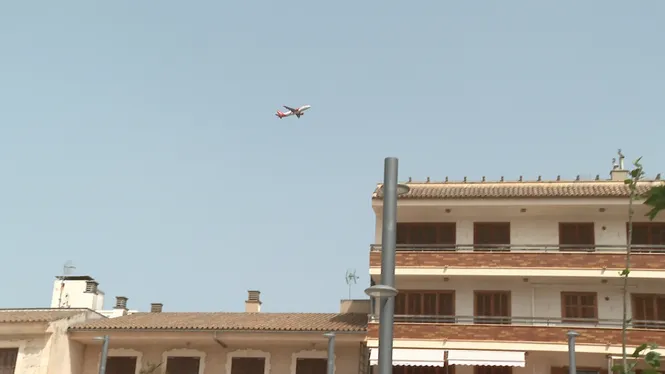PalmaRosa García Moreno (Palma, 1981) and her sister were born in El Forte, in Palma, but the family came from a town between Seville and Córdoba. His mother kept the houses and stairs clean. His father was an electrician and worked in hotel maintenance. Assets weigh. They always do. Working class, outsiders. Art and literature were the way to create an identity without the burden of these conditions. Fine arts studies in Barcelona, unstable jobs, meeting new people. She didn’t want to go back, but she did. Or as he likes to say, he came, because the one who returned was someone else. In the absence of a commitment to a traditional artistic discipline, Rosa García has dedicated herself to mediation and management, especially working alongside Mar Barcelo at Sa Galanía, to foster projects where art creates possibilities that did not exist before.
We have coffee at the Sa Travessa bar, just off Plaça de Raimundo Clar, near where Rosa García currently works. We talk while sitting in the corner, surrounded by people eating a snack.
What prompted you to study art?
—He was always concerned about art and literature, which was not present at home. I think I need other languages to deal with life. At the age of 14 or 15, I went to libraries, because there was only one encyclopedia at home. I discovered art and approached literature in a chaotic, unaccompanied way, but I saw a crack, a possibility. When I finished school, I went to Plaça del Tub to do my Bachelor of Arts and then I wanted to go to Barcelona. I was thinking about not coming back. Things were very good there: Barcelona is a difficult but welcoming city, and belonging is not necessary. On the other hand, here is a lot. Now I understand that it is indispensable to connectedness, but at the time, for my teenage self, the topic of belonging was complicated.
Little has been said about the identity crisis that was supposed to be the child of strangers…
– In addition, there is another important part, which has nothing to do with origin, but with social class. Class bias creates an awkward rift for all parties. When I was studying in Barcelona, I was on a scholarship, but I worked in many very precarious jobs, and you see that in your class there are not many female classmates who work two jobs. Low purchasing power makes you connect to the world in a very specific way, which leads to access to culture. In addition, the ceiling of class and connections is very heavy in the cultural field in general, but in contemporary art it is very heavy.
What is your specialty in Barcelona?
– I didn’t make any itinerary. I did a little bit of everything. I was very interested in theoretical subjects, the anthropology of art, and those that involve thinking about art. But my practice revolved around installation art and ephemeral works. I started a higher course in sculpture and did a year of scenography. There was something about space that interested me. I didn’t paint any painting, no photograph, nothing specific. What do you do? What do you paint? Nothing.
How long have you been away?
– I think 12 years. When I returned to family circumstances, I felt afraid. He helped me change the verb: he was saying I didn’t come back, I arrived. It was someone else. Here I found a job at Dixal, which was a great learning experience, and at the same time I started the Sa Galania project with Mar Barceló. With Mar, we form a great tandem, I think especially on the personal side.
How was Sa Galania born?
– The Sa Galanya twins started in Barcelona, in 2006. Here we both started to maintain our jobs, doing mediation projects. We use contemporary art as a tool, lifting it off the pedestal it sometimes sits on. Art is a pretext to deconstruct things and put them back together in a different way. Art without context is meaningless. Any practice, especially artistic mediation, has no meaning without the social and territorial context. You can’t do projects without looking around. Mar and I have always had this conversation. It’s very easy to fall into manipulation, especially if you work with different entities that want the outcome of the project to be a very specific image. The fact that you decided to move the microphone and focus on the space implies a discourse. It’s a sensitive part. This thing about “giving voice”… Who are you to give voice to? We always doubt and I think that’s interesting. Sometimes the outside look is really stigmatizing, and with art, literature, journalism we do that all the time… The lives of others, right? And this neutral position is terrifying.
Among the projects you have done, which one do you particularly remember?
– Above all Transit areasa project in which we worked with the elderly from Solidat and the young people who were studying there, because when we brought them together, the mediation almost disappeared. Before, the elderly didn’t trust the young people, and the young people thought that the elders would look down on them, but when we gave them space to talk, incredible connections were made. In the end, it’s about creating situations where people can dialogue, and that doesn’t usually happen. When that happens, you see that the construction of the other is completely unrealistic. You think that society is making a mistake by removing meeting places: collectivism doesn’t work well. Individualism is killing us.
I also worked as a bookseller at Los Oficios Terrestres…
— Los Oficios is the benchmark. Not just for me. It’s hard for something like that to happen again, it had to disappear to take its rightful place. Meeting Lola, Manu, Natalia and everyone who happened to be there opened my mind a lot, they showed me a way to do things and to be close to the activity and within it, but always on the margins and playing. It was very well placed with feminist, LGBT books. When you do that you choose not to settle. But on Saturdays we had wine, presentations, it was a meeting place. It’s true that his physical condition made it difficult to continue, but it was also interesting for that reason. If you’re there, it’s because you want to be there.
What projects are you involved in now?
– By installing plants in the yard and keeping them alive in the summer [riu]. With Sa Galania, after 2020, we stopped, and now we do more projects for fun, because we both already have jobs that allow us to pay the rent. I work at Flassaders as an activity programmer and the critical thinking streak allows me to put a lot of myself into it. In this aspect I am happy. Art is always swirling, even though I left my art practice long ago. I do other things. Generate bodyless proposals and interactions.
I was left with the feeling that you were somehow “strange” as a vital state, always on the margins, between being one thing and another.
– It seems interesting to me. There’s this 90s word, interdisciplinary… Sometimes we need to mix perspectives. For me, before, it was very uncomfortable not being able to define myself, in the personal sphere and in the work sphere; but now it’s a comfortable enough space. In fact, it makes me laugh. How do our jobs and our relationships define us? Maybe we should focus more on other things.

“Professional web ninja. Certified gamer. Avid zombie geek. Hipster-friendly baconaholic.”









